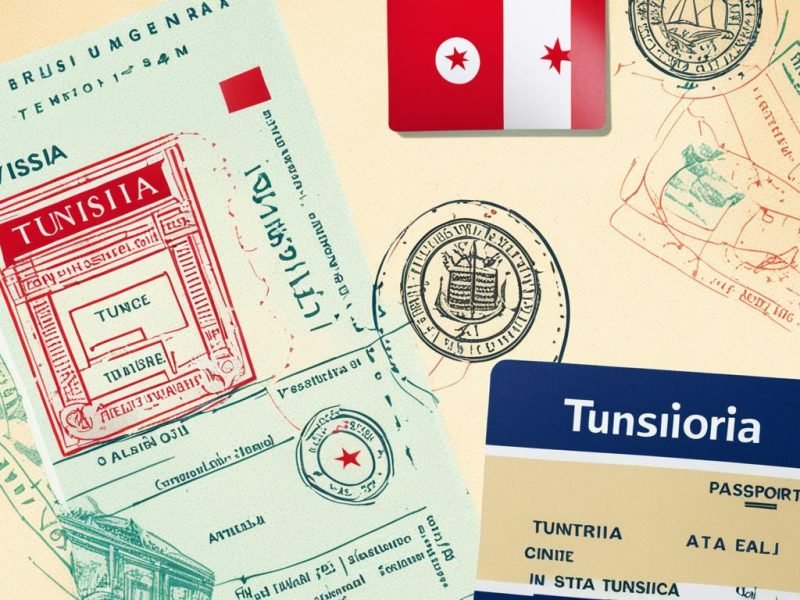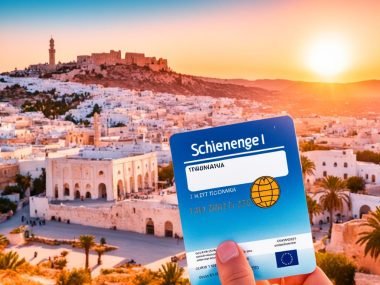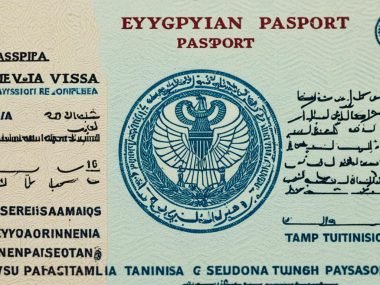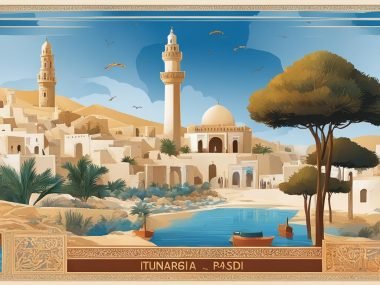Are you planning a trip to Tunisia from Australia? Wondering if you need to go through the hassle of getting a visa? Well, here’s some good news for you: Australian citizens traveling to Tunisia for short-term tourism purposes do not require a visa for a stay of up to 90 days. But, before you pack your bags, there are a few essential things you need to know and prepare for your trip.
When it comes to traveling to Tunisia from Australia, understanding the visa requirements and entry process can save you time and ensure a smooth journey. So, let’s dive into the details and get all your questions answered.
Key Takeaways:
- Australian citizens do not need a visa for a short-term stay of up to 90 days in Tunisia.
- A valid passport, with at least six months of validity beyond the intended stay, is necessary for entry into Tunisia.
- Proof of sufficient funds, confirmed onward/return airline tickets, and documents showing the purpose of the trip are required for entry.
- It is advisable to check with the airline for any changes in boarding requirements.
- Be sure to stay informed about local restrictions, transportation options, and travel safety in Tunisia.
Entry Requirements for Tunisia
When planning a visit to Tunisia, it is essential for Australian citizens to be aware of the entry requirements. Here are the key details you need to know:
Passport Validity
Australian citizens visiting Tunisia must have a passport that is valid for at least six months beyond the intended stay. It is crucial to ensure that your passport meets this requirement to avoid any issues during your travel to Tunisia.
Proof of Sufficient Funds
In addition to a valid passport, travelers to Tunisia are required to provide proof of sufficient funds to cover their stay. This can include bank statements, credit card statements, or any other documents that demonstrate your financial capability.
Confirmed Onward/Return Tickets
As part of the entry requirements, it is important to have confirmed onward or return tickets. This serves as evidence of your intention to leave Tunisia within the permitted timeframe.
Purpose of the Trip
Travelers must also provide documents showing the purpose of their trip to Tunisia. This can include hotel reservations, tour itineraries, or any other relevant documentation that supports the purpose of your visit.
It is important to note that these entry requirements are subject to change, so it is advisable to confirm the latest information with the nearest embassy or consulate of Tunisia before your travel.
Visa Application Process for Tunisia
If you’re an Australian citizen planning a trip to Tunisia for short-term tourism purposes, you’ll be pleased to know that you do not need to apply for a visa. However, it is important to ensure that all entry requirements are met, including a valid passport and supporting documentation.
To enter Tunisia, you will need:
- A valid passport with a minimum of six months validity beyond your intended stay
- Proof of sufficient funds to cover your stay in Tunisia
- Confirmed onward/return airline tickets
- Documents showing the purpose of your trip, such as hotel reservations or an itinerary
For short-term stays of up to 90 days, no visa application is required. However, it is always recommended to have all the necessary documents ready when entering the country. These entry requirements are subject to change, so it is advisable to check with the airline for any updates or changes in boarding requirements.
Travel Tip: It’s always best to be well-prepared and have all the required documents ready, even if you don’t need to apply for a visa.
For longer stays or if you plan to engage in different activities in Tunisia that require specific visas, it is advisable to contact the embassy or consulate of Tunisia for detailed application requirements and processing times. They will be able to provide you with accurate and up-to-date information regarding the visa application process and any additional requirements you may need to fulfill.
Embassy of Tunisia in Australia:
- Address: [Insert Address]
- Phone: [Insert Phone Number]
- Email: [Insert Email Address]
Consulate of Tunisia in Australia:
- Address: [Insert Address]
- Phone: [Insert Phone Number]
- Email: [Insert Email Address]
Keep in mind that visa processing times may vary, so it is advisable to apply well in advance of your intended travel date to allow for any unforeseen delays. It’s always better to be prepared and have your visa application submitted with ample time to avoid any last-minute complications.
Remember, if your visit to Tunisia is for short-term tourism purposes, you can enjoy the country without the hassle of a visa application. However, make sure to have all the required documentation and entry requirements ready to ensure a smooth entry into Tunisia.
Travel Tips for Australians visiting Tunisia
When traveling to Tunisia, it is important to be aware of local restrictions and follow the guidance of local authorities. Here are some essential travel tips to ensure a safe and enjoyable trip:
Tunisia travel safety
Stay updated on the current travel safety situation in Tunisia. Check for any travel advisories or warnings issued by your country’s government. It is also recommended to register with the nearest embassy or consulate upon arrival.
Health measures in Tunisia
Keep yourself informed about the health measures in place in Tunisia. The requirements may change at short notice, so it is important to stay updated. Make sure to follow any guidelines or regulations implemented by the local authorities to ensure your well-being.
Strikes and protests in Tunisia
Tunisia occasionally experiences strikes, protests, and demonstrations, often with little notice. These events can disrupt transportation services and essential facilities. Stay cautious and avoid areas where demonstrations are taking place. It is advisable to monitor local news and follow the guidance of local authorities.
Border crossings in Tunisia
Due to the security situation in neighboring countries, border crossings in Tunisia may have heightened security. Be prepared for additional security checks and follow the instructions provided by border officials. It is advisable to carry all necessary travel documents, such as passports and visas, while crossing the borders.
Travel to desert areas in Tunisia
If you plan to visit the desert areas in Tunisia, it is essential to obtain permission from the Tunisian authorities. Additionally, ensure the services of licensed guides who are familiar with the region. This is crucial for your safety as the desert environment can be challenging and potentially hazardous without proper guidance.
Local road rules and transportation
Be familiar with the local road rules if you plan to drive in Tunisia. Road conditions may vary, and driving practices can differ from what you are accustomed to. It is advisable to avoid driving outside cities after dark and exercise caution while using public transportation, especially in crowded areas.
“Travelers should stay informed about the current situation in Tunisia and follow any advice or instructions provided by local authorities.”
By following these travel tips, Australian visitors can have a memorable and safe experience exploring the beautiful country of Tunisia.
| Tunisia Travel Tips | Recommendations |
|---|---|
| Stay updated on travel safety information | Check travel advisories and register with the nearest embassy or consulate |
| Stay informed about health measures | Follow local health guidelines and regulations |
| Awareness of strikes and protests | Avoid areas with demonstrations and monitor local news |
| Follow border crossing procedures | Carry necessary documents and comply with border officials |
| Permission for desert travel | Obtain authorization and hire licensed guides for desert trips |
| Familiarity with local road rules | Exercise caution while driving and avoid driving at night |
Transportation in Tunisia
When visiting Tunisia, there are various transportation options available to explore the country and navigate between destinations. Whether you prefer public transportation, driving, or air travel, Tunisia offers a range of choices to suit different preferences and travel needs.
Public Transportation
If you prefer to use public transportation to get around Tunisia, there are buses and trains available. The Tunis Transport Company manages buses within the country, providing convenient and affordable transportation options. This is an ideal choice for traveling within cities and towns, offering a chance to experience the local culture.
When utilizing public buses and trains, it’s important to be cautious of petty crime, particularly on crowded routes. It is advisable to keep personal belongings secure and be vigilant of your surroundings at all times.
Driving in Tunisia
Driving in Tunisia is another option for getting around, especially if you prefer the flexibility and independence of having your own vehicle. However, it’s important to note that driving conditions can be challenging due to poorly maintained vehicles and local driving practices.
When driving in Tunisia, it’s essential to follow local road safety regulations and exercise caution. Military or police security checks are common on roads, so it’s important to cooperate if requested. Additionally, it is advised not to drive outside of cities after dark, as roads may be poorly lit, and it can be more challenging to navigate.
Rail Travel
For those who prefer train travel, Tunisia has a rail network that provides a convenient and efficient way to explore different regions of the country. Trains offer a comfortable and scenic journey, allowing you to enjoy the picturesque landscapes of Tunisia.
Air Travel
If you’re looking to travel long distances or shorten your travel time, air travel is a viable option. Tunis-Carthage International Airport serves as the main gateway for international flights, connecting Tunisia to various destinations around the world.
When traveling by air, it’s important to note that security screening measures are in place at the airport, ensuring the safety of all passengers. It is advisable to arrive at the airport ahead of time to allow for security procedures and check-in processes.
Overall, Tunisia offers a diverse range of transportation options, catering to different travel preferences and needs. Whether you choose to experience the local culture through public transportation, explore at your own pace by driving, enjoy a scenic train journey, or save time with air travel, there is a transportation mode that suits every traveler’s requirements.
Comparison between Tunisia and Australia
When comparing Tunisia and Australia, it becomes evident that these countries differ significantly in various aspects, including size, population, diplomatic missions abroad, and travel freedom.
Tunisia vs Australia: Population
Tunisia is considerably smaller in size compared to Australia, both in terms of land area and population. While Australia covers a vast area and is home to approximately 25 million people, Tunisia has a land area that is significantly smaller and a population of around 12.3 million people.
Diplomatic Missions
A notable contrast between Tunisia and Australia lies in their diplomatic missions abroad. Australia, being a prominent global player, has a vast network of diplomatic missions around the world. On the other hand, Tunisia has a more limited presence, reflecting its smaller international influence.
Travel Freedom
In terms of travel freedom, Australian passport holders enjoy greater mobility compared to Tunisian passport holders. Australians benefit from visa-free or visa-on-arrival access to numerous countries, granting them the freedom to explore various destinations with ease. In contrast, Tunisian passport holders face more restrictions and may require visas for several countries, thus having limited travel freedom.
“Tunisia and Australia have distinct differences in terms of population size, diplomatic presence, and travel freedom, reflecting their unique geopolitical positions.”
Overall, Tunisia and Australia showcase contrasting characteristics in population, diplomatic missions, and travel freedom. While Australia stands as a larger and more influential country with a wider diplomatic reach and greater travel freedom, Tunisia holds its own charm and offers unique cultural experiences within a smaller context.
| Tunisia | Australia | |
|---|---|---|
| Population | Approximately 12.3 million | Approximately 25 million |
| Diplomatic Missions Abroad | Limited presence | Extensive network |
| Travel Freedom | Restricted for Tunisian passport holders | Visa-free travel to numerous countries for Australian passport holders |
Through these differences, Tunisia and Australia showcase their unique characteristics, offering travelers diverse experiences and opportunities.
Conclusion
Australian citizens traveling to Tunisia for short-term tourism purposes do not require a visa for a stay of up to 90 days. This visa exemption provides a hassle-free entry for Australians, allowing them to explore the rich history, culture, and landscapes of Tunisia without the need for additional paperwork.
However, it is important to ensure that all entry requirements are met to avoid any complications during the trip. Australian travelers should have a valid passport with at least six months of validity beyond their intended stay and carry supporting documentation, such as proof of sufficient funds and confirmed onward or return airline tickets.
While Tunisia offers a rewarding travel experience, it is essential to stay informed about local restrictions, transportation options, and travel safety. Keeping up-to-date with any changes in health measures, strikes, protests, and border crossing requirements will contribute to a smooth and enjoyable trip. It is also recommended to familiarize oneself with local road rules and exercise caution when using public transportation.
By following these guidelines, Australian tourists can embark on a memorable journey through Tunisia, discovering its ancient ruins, vibrant markets, and stunning Mediterranean coastline with ease and peace of mind.







